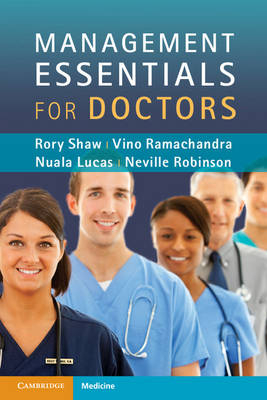
Management Essentials for Doctors
Cambridge University Press (Verlag)
978-0-521-17679-8 (ISBN)
Management skills and a sound knowledge of the NHS are mandatory for consultant and general practice careers. Management Essentials for Doctors is an invaluable resource for trainee doctors, hospital consultants and general practitioners, as well as a compendium of 'hot topics' for all doctors preparing for medical interviews. Written by doctors, for doctors, the 60 topics provide: • Clear descriptions of NHS structures, functions, policy and procedures • Detailed coverage of core management skills • An in-depth review of professional, governance, safety and quality issues Written in an easy-to-read style, with alphabetically listed themes for quick reference, Management Essentials for Doctors is not only an indispensable guide for busy clinicians, educational leads and medical managers but also a practical resource for interview preparation and career development.
Professor Rory Shaw is Medical Director at North West London Hospitals Trust, Northwick Park Hospital, Harrow, UK. Dr Vino Ramachandra is a Consultant Anaesthetist at Northwick Park and St Mark's Hospitals, Harrow, Middlesex, UK. Dr Nuala Lucas is a Consultant Anaesthetist at Northwick Park Hospital, Harrow, Middlesex, UK. Dr Neville Robinson is a Consultant Anaesthetist at Northwick Park Hospital, Harrow, Middlesex, UK.
Foreword; Preface; Acknowledgements; Part I. Core Knowledge: 1. Audit; 2. Care bundles; 3. Checklists; 4. Clinical dashboards; 5. Complaints procedure; 6. European working time directive; 7. Good medical practice; 8. Guidelines; 9. Medical interviews; 10. Preparation of a curriculum vitae; 11. Role of the consultant; Part II. Core Skills: 12. Chairing meetings; 13. Educational supervision; 14. Effective delegation; 15. Leadership styles; 16. Leadership competencies; 17. Mentoring; 18. Time management; Part III. Important Bodies: 19. General Medical Council; 20. National Clinical Assessment Service; 21. National confidential enquiry into patient outcome and death; 22. National Institute of Clinical Excellence; 23. Postgraduate medical education and training board; Part IV. Information, Evidence and Research: 24. Information management; 25. Evidence based medicine; 26. Research funding in the NHS; 27. Research governance; Part V. Money: 28. NHS financial flows; 29. The contract; 30. The QIPP agenda; 31. The budget; 32. Writing a business plan; Part VI. NHS Structures: 33. NHS structure and organisation; 34. Commissioning healthcare; 35. External regulators; 36. Treatment centres; 37. Who does what – the Trust Board; 38. Who does what – the executive et al; Part VII. Operations: 39. Activity and targets; 40. Clinical process re-design and lean thinking; 41. Managing change; Part VIII. Safety and Quality: 42. Patient safety; 43. Recent disasters in healthcare in England; 44. Litigation; 45. Clinical governance; 46. Risk management; 47. Ensuring quality; 48. Quality indicators; 49. Patient feedback; Part IX. Staff Issues: 50. Managing staff; 51. Getting an employee in the organisation and starting work; 52. Managing normal working; 53. Job planning; 54. Appraisals; 55. Revalidation; 56. Managing poor performance; 57. Managing other problems; 58. Measuring how well we manage staff; 59. Managing stress; 60. The sick doctor.
| Erscheint lt. Verlag | 17.11.2011 |
|---|---|
| Zusatzinfo | 6 Tables, black and white |
| Verlagsort | Cambridge |
| Sprache | englisch |
| Maße | 156 x 233 mm |
| Gewicht | 350 g |
| Themenwelt | Medizin / Pharmazie ► Gesundheitswesen |
| Medizin / Pharmazie ► Medizinische Fachgebiete ► Medizinethik | |
| ISBN-10 | 0-521-17679-4 / 0521176794 |
| ISBN-13 | 978-0-521-17679-8 / 9780521176798 |
| Zustand | Neuware |
| Haben Sie eine Frage zum Produkt? |
aus dem Bereich


